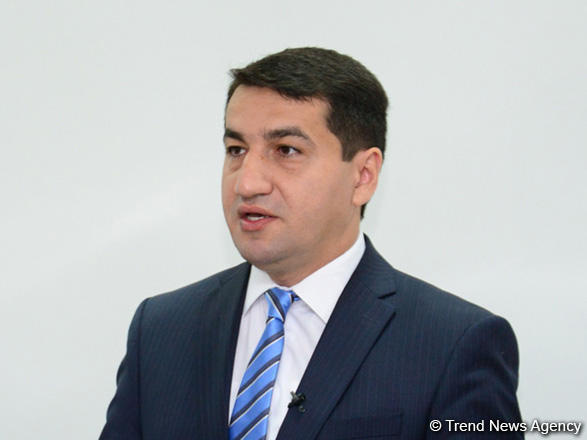Baku, Azerbaijan, Aug. 23
Trend:
Being a parliamentarian does not give ground for violating the laws of other countries, the Spokesman of the Azerbaijani Foreign Ministry Hikmet Hajiyev told Trend Aug. 23.
Hajiyev commented on the intention of the German parliamentarian to visit the occupied territories of Azerbaijan from the Azerbaijani side.
Hajiyev noted that if the German MP intends to visit the occupied territories of Azerbaijan from the Azerbaijani part of the line of contact, he must address with a written apology, express respect for the laws, sovereignty and territorial integrity of Azerbaijan.
Earlier, the member of German Parliament Albert Weiler was included in the list of "undesirable persons" for his illegal visits to the occupied territories of Azerbaijan in 2014 and 2016.
"He, as a representative of the legislative body, must respect the laws of the UN member states. Being a member of parliament does not give grounds to anyone to violate the laws of other countries. Everyone should know that such illegal visits serve to encourage the separatist regime created in the occupied territories of Azerbaijan as a result of military aggression and bloody ethnic cleansing and hinder the resolution of the conflict by peaceful means in accordance with international law," he said.
Hajiyev added that violation of the laws, that are identical in all UN member states, by the mentioned MP and the further attempt to justify this step is a big mistake.
"Also, it cannot be ruled out that such provocative steps pursue an unsuccessful goal specifically to harm the development of relations between Azerbaijan and Germany. Furthermore the Azerbaijani Embassy in Germany repeatedly made nonverbal warning about illegal trips to the occupied territories of Azerbaijan and the negative consequences of these trips. In any case, this person has been included in a list of "undesirable persons" for violating the laws of Azerbaijan," he said.
The conflict between the two South Caucasus countries began in 1988 when Armenia made territorial claims against Azerbaijan. As a result of the ensuing war, in 1992 Armenian armed forces occupied 20 percent of Azerbaijan, including the Nagorno-Karabakh region and seven surrounding districts.
The 1994 ceasefire agreement was followed by peace negotiations. Armenia has not yet implemented four UN Security Council resolutions on withdrawal of its armed forces from the Nagorno-Karabakh and the surrounding districts.






